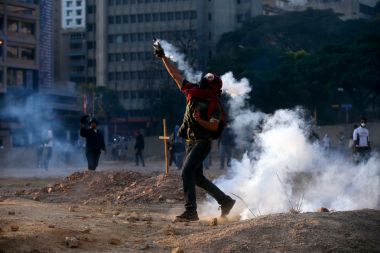Vatican to mediate in Venezuela amid protests over high crime rates and economic stagnation

Vatican representatives have been invited to mediate as members of the Venezuelan opposition and government officials agree to talks aimed at ending the ongoing civil unrest.
There have been a reported 39 deaths in the country since civil unrest began in mid-February this year.
The protests began after former Miss Venezuela, Monica Spear, and her British husband, Thomas Berry, were killed in in front of their 5-year-old daughter following a suspected robbery.
This was followed by an attempted rape at the University of the Andes in San Cristobal. A protest in response calling for more student safety and better policing resulted in harsh government crackdowns, bringing more people to the streets to protest on other issues like the lagging economy, high rates of crime, and the chronic shortage of essential items.
President Nicolas Maduro's government agreed yesterday to meet with representatives of the Democratic Unity opposition coalition (MUD) for the first time since the unrest began.
Preliminary talks to arrange later meetings were overseen by foreign ministers from the South American regional bloc, Unasur.
After those talks, Vice President Jorge Arreaza told Reuters: "We spoke frankly, directly and respectfully. There were moments of tension, but we agreed to start a cycle of meetings.
"We are sending a good signal to our country by sitting down to talk, converse and resolve our differences.
"We're not trying to convince the opposition to become 'Chavistas' nor are they trying to convince us to abandon the path of the revolution and socialism."
Issues that are likely to be discussed include crime and the economic situation, which has been dire in recent years. At one point, the country's economy faltered so badly it could not import paper.
One Christian worker in the country who wanted to remain anonymous said: "Economic policies have led to a shortage of basic goods such as milk, meat, chicken, toilet paper, cooking oil, butter, flour, and other goods."
Opposition groups are also calling for the release of jailed protest leader Leopoldo Lopez and dozens of imprisoned students.
One hardline opposition leader, Maria Corina Machado, said on Twitter: "There cannot be dialogue when students, mayors, and Leopoldo Lopez are prisoners, and the repression continues."
Mr Lopez, who had previously written a letter to Pope Francis calling for him to guide the country through its present crisis, called for continued peaceful protests and expressed skepticism about the new talks.
In messages on Twitter posted by his wife, Mr Lopez said: "I believe in dialogue, but a dialogue of equals, not one side on its knees. We've seen for 15 years how the dictatorship does dialogue."
But MUD leader Ramon Guillermo Aveledo said the opposition's negotiations would ensure that students who began the protests would not be forgotten.
Speaking about the possible inclusion of Vatican facilitators to the negotiation, Mr Aveledo said to Reuters: "We have agreed to the presence of a third party who will help us in this difficult path."
Vatican spokesman, Reverend Federico Lombardi, had said last Friday, in response to earlier suggestions of involvement from the Papacy, that Cardinal Pietro Parolin, the former Vatican ambassador to Caracas, was eager to offer assistance.
In the Huffington Post, Rev Lombardi said that Cardinal Parolin was "certainly willing and desirous to do whatever is possible for the good and serenity of the country".
This is not the first time Vatican officials have mediated a Latin American conflict. In 1978, Pope John Paul II sent an envoy to solve a territorial dispute between Argentina and Chile over the Beagle Channel and its islands that almost resulted in war.
However many are fearful that the talks will end the possible 'Venezuelan Spring', and that the removal of President Maduro that many protesters wanted now appears unlikely.
Although protestors have not numbered in the millions as was seen in the Arab Spring uprisings of 2011, students have been successful in continuing the protests via use of barricades and other disruption tactics.
Several students have been posing naked on social media to protest after a student at a university in Caracas was beaten and stripped last week.
Many government supporters are also doubtful of progress, noting the number of similar initiatives that the opposition has boycotted in the past.
Speaking last week when the plausibility of Vatican involvement was first mentioned, President Maduro was quoted by Reuters as saying of Cardinal Parolin: "Poor guy, they're [the opposition] going to waste his time."
Formal talks between the opposition and the government are expected to begin on Thursday.











